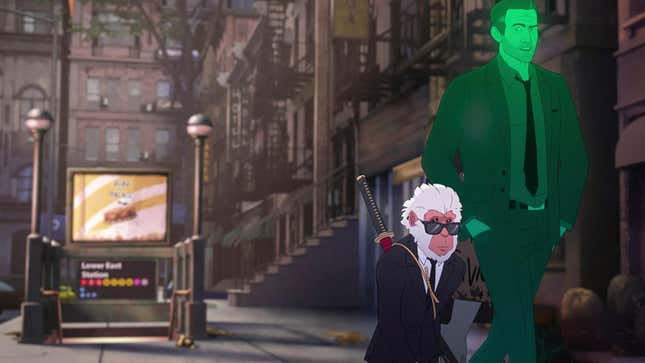
Setting aside all the rude posturing of Deadpool & Wolverine, there’s still nothing as profane or patently ridiculous in the current Marvel canon as Marvel’s Hit-Monkey. This violently comedic Hulu animated series, co-created by Will Speck and Josh Gordon (based on comics by Daniel Way and Dalibor Talajić), has proven to be as nimble and unkillable as its namesake, overcoming the complicated tumult of Marvel Television that saw cancellations of fellow Hulu projects like M.O.D.O.K. and Helstrom.
For better or worse, Marvel’s televised ambitions may continue to evolve, but you just can’t keep a good-bad monkey down. As fans of season one discovered to their morbid delight, that’s not due to a lack of trying. The early episodes followed the eponymous Monkey (Fred Tatasciore) as he improbably mowed down Yakuza in the streets of Tokyo following their massacre of his snow monkey tribe, which, as these things tend to do, spiritually tethered him to a dead hitman named Bryce (Jason Sudeikis). Among many other things, adversity was felled by the power of Monkey’s katana (and, yes, all those guns).
The gimmicky nature of that premise aside, it was a refreshing and frequently blistering season of cause and effect, where violence came with consequences—sometimes played for laughs but always in service to the story—and its characters experienced effective growth. Had Hit-Monkey gotten the axe like those other Marvel/Hulu jobs, its knack for neo-pulp and ballistic action (plus its killer soundtrack) might have secured its reputation as Marvel’s first true cult item.
With the series now operating under 20th Television Animation, home to high-profile animated shows like The Simpsons and Bob’s Burgers (not to mention being saddled with all that Marvel baggage), the perception of Hit-Monkey as a scrappy TV underdog (under-simian?) becomes complicated. There’s also something dispiritingly familiar about this new season, something derivative of older and lousier comic adaptations, which taxes this nervy, chaotic caper of its charms. While the stuff that made Hit-Monkey fun and unique remains mostly intact, it sometimes seems rueful, if not critical, of its wilder tendencies. Why so glum, my red-bummed chum?
With Monkey’s Tokyo revenge sated last season, the show’s star attraction now reflects on his inner beast in the wilds of New York City. This new scenery and deeper contemplation shouldn’t suggest Hit-Monkey has gone soft. The series is simply more in tune with its emotions this go-around. And while it’s become far more chatty about trauma’s internal and external tolls, what keeps season two from feeling platitudinous is how these struggles often manifest in peculiar and occasionally terrifying ways: Bryce’s private demons, for instance, take the form of a devil (Keith David), who fittingly exploits their infernal bargain established last season. (Sidebar: It is a hoot to hear David, the star of Todd McFarlane’s Spawn, voice the devilish end of a Mephistophelean pact for a change.) Haruka (Ally Maki) now wields the Bonsai Master’s sword, which gives her a creative outlet for dealing with the loss of her mentor, Ito (Nobi Nakanishi), often with harrowing results.
As Bryce hones his ability to interact with the living as the world’s most obnoxious poltergeist, he also wrestles with his sins as a hitman. Predictably, Monkey’s problems end up scraping against his own. Hit-Monkey has always been as much Bryce’s show as Monkey’s (despite Sudeikis’ name tacked on at the end of the credits), though his personal exploration eats more screen time now. Monkey sometimes feels like a second banana, which draws attention to the mechanical functions of this season. Put it this way: While redemption arcs rarely feature a grunting primate in designer shades, Bryce’s strained relationship with his estranged daughter Iris (Cristin Milioti) doesn’t feel any more novel because it takes place in Hit-Monkey season two.
So, as Bryce works through his issues with Iris and Monkey contends with the finality of his deeds, their new contracts under Bryce’s former handler, Eunice (Leslie Jones), put them in the orbit of The Assassin’s Cooperative, a crew of reformed killers-for-hire entangled in a war with a secret cabal called The Aldermen. The Cooperative, which espouses the importance of mental health days and talks a big game about changing the world for the better, gives Monkey a newfound purpose beyond killing and mayhem, a deliberate far cry from the whiskey-and-drug-fueled hedonism of his earlier exploits. Naturally, Bryce calls bullshit.
The Cooperative’s presence contributes in part to this season’s conspicuous self-criticism. Their exploits with Monkey and Bryce have a larger scale than we’ve seen before, and the action is often more engaged with the series’ supernatural aspects than those more immediate hack-and-slash sessions from last season. Their clashing personalities and colorful power sets also feel like a response to the high-octane action in Prime Video’s Invincible and a means to make Monkey and Bryce feel more superheroic than their distinctive schtick should allow. All this vibrant mayhem (and an uninspired mid-season McGuffin chase) puts distance between the violence Monkey does and how the viewer engages with it. While bullets fired at mystical creatures don’t have the same effect as those emptied into human bodies, animated though they may be, Monkey rarely seems to appreciate the difference. The Monkey returns, and this time, he’s sad.
For all these gripes, there’s no denying Hit-Monkey keeps most of its edge. Its commitment to balancing gallows humor with genuine emotional stakes is admirable, considering how outlandish its premise contrasts all this introspection. It’s still inventive where it counts. Some of the better action set pieces include a shootout in a public library (with silencers, natch), a giant chase through Greenwich Village that allows Monkey to thwip about the skyline like a certain Web-Head, and a home redecoration sequence that evokes Skyfall. Only this time, it has more on its mind than visceral thrills. As a rowdy rumination on redemption, forgiveness, and the enduring quest for purpose in a world gone ape, Hit-Monkey still has appeal.
Marvel’s Hit-Monkey season two premieres July 15 on Hulu.